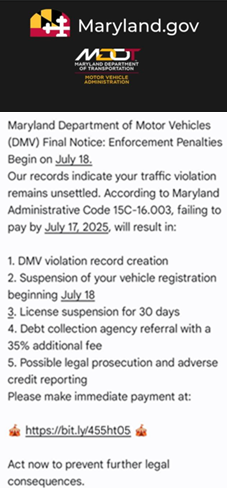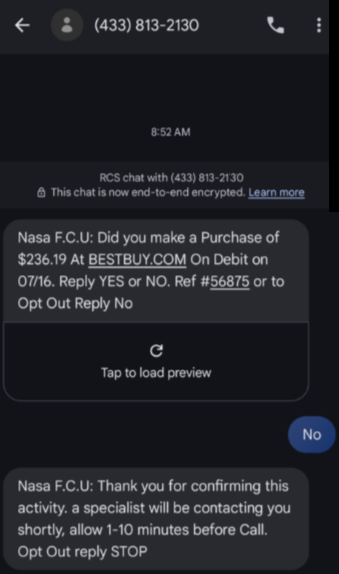Stay Vigilant. Stay Safe. Stay Ahead of the Scammers.
February 20, 2026
Digital scams are
on the rise and they're getting more sophisticated. As scammers continue to develop new and ever-more
sophisticated techniques to trick consumers, be on the lookout for the
following telltale signs for a scam:
"Act Now" or Else!
Messages like the one below urge you to "Act Now" or "Make an Immediate Payment" or else you will be hit with severe punishment. The message is bogus as is the Administrative Code, Bit.ly URL to mask the true destination, and empty threats.

If you receive an urgent message, do not act or click any links. If you're truly unsure, contact the business or entity directly using trusted sources – never from the message in question.
Grammatical Errors & Strange Design
Be cautious if you receive messages containing numerous grammatical errors. In this example, it's phishing because:
1) All of NASA is not capitalized
2) Multiple actions are listed if you respond with "No"
3) Random capitalization and inconsistent punctuation

When you respond, fraudsters will contact you posing as a NASA Federal employee and attempt to extract personal information from you. Then they'll use that information to access your accounts.
Urgent Notices
Impulse and panic are a fraudster's best friend. Most scams (like in this example below) include a time element used to create a false sense of urgency. They want you to act quickly and not think.
If you ever receive an 'urgent' message from NASA Federal, do
not click any links. Instead, log directly in to your NASA Federal account to
view or send messages.
Generic Greetings & Suspicious Links or Attachments
Fraudsters love to take shortcuts. It's easier to send mass texts/emails without your name featuring companies we all use.
Be cautious if you receive communication containing
blurry logos, strange design, grammatical errors, suspicious links, and
downloadable software. These are always a phishing scam – delete ASAP.
"Too
Good To Be True" Offers
Whether it's a high-paying job, investment opportunity, or a chance at romance, dangling "too good to be true" offers is a way fraudsters use social engineering to gain access to your accounts.
In this example, a recruiter (with an email that
doesn't include her name or company), offers a low-work job with robust pay and
benefits. They ask the recipient to respond via text to establish rapport and a line of
communication in hopes of gaining access to your information and inevitably, your money.
Stay
Vigilant in the Fight Against Fraud
At NASA Federal Credit Union, we’re committed to helping you spot common signs of fraud and protect what matters most: your financial well-being. If you receive a call, text, or email that you think may not really be from NASA Federal, DO NOT RESPOND.
Do not click links, open attachments, or provide other personal information like passwords, PINs, or account numbers. Simply delete. The
best way to fight against fraud is to pause and think.
If you think you’ve been targeted by a scam or
suspect fraud on your account, contact us immediately at 1-888-NASA-FCU.

